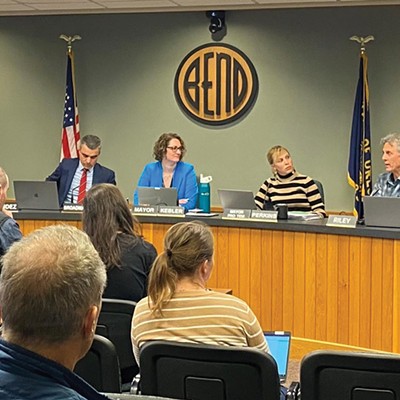Much has been said this month about the notion of "defunding the police." While the term "defund" suggests zeroing out police budgets, what it more frequently means is choosing to place less money into police budgets, and more into support services such as mental health and crisis support teams. Varying reports show figures regarding how often law enforcement officers respond to calls related to mental health crises. One study, conducted by The Washington Post, found that 25% of those shot and killed by law enforcement officers in 2015 were having a mental health crisis.
So, while the notion of defunding the police might sound like it means spending less on one public agency, it actually accounts for a stable or increase in funding of public safety and health services. Here in Deschutes County, we have a perfect—and timely—example of how struggling public service budgets can translate directly into forcing city police officers and sheriff's deputies to do the work of mental health professionals.
Last week, the long-awaited Crisis Stabilization Center opened in Deschutes County. The center offers a calming, welcoming place for people experiencing a mental health crisis to get support services. Rather than being transported to jail, people in crisis can go there. This is a big step forward for our community in not only helping people in need, but also in placing less burden on law enforcement officers to handle crises they are not professionally trained to handle. Crisis counselors and mental health professionals spend years being educated and trained in de-escalation and defusing crises; to expect law enforcement officers to handle those situations with the same level of expertise as a mental health professional is not fair to the person in crisis, nor to the officers.
And while Deschutes County should be commended in getting this center opened, it is currently staffed only Monday through Friday, from 8am to 4pm—meaning that there are many hours in the day when a person in crisis will go to jail instead. In the years that the center has been in the planning phases, the goal has been to staff the center 24 hours a day—but county officials didn't budget enough funds, and the hours got cut. Now it's relying on getting a competitive state grant in order to run 24/7 starting this fall. Even without the grant, the hope is to open the center seven days a week, from 7am to 9pm, by August, according to Crisis Program Manager Holly Harris.
In economic downturns, it is necessary to cut budgets—and inevitably, that will happen. Both the City of Bend—which has contributed funds toward the stabilization center—and Deschutes County, along with federal grants, have contributed to getting the center off the ground. Right now, the City of Bend is facing a budget shortfall of about $14 million due to the pandemic. Deschutes County is in a similar situation. These signs point to the obvious: Public entities are not in a position to allocate more funds toward crisis stabilization than they have. But a little more examination of those budgets reveals at least a few opportunities.
It would cost Deschutes County $2.5 million to operate the center 24/7, Harris told the Source. Earlier this spring, the Deschutes County budget was set to allocate $49 million toward the Sheriff's Department. The Sheriff's Department had hoped to purchase a helicopter to aid in search and rescue operations. The price tag: $3 million for the aircraft alone. The purchase has been tabled, but it highlights the current priorities among local law enforcement. In the current environment, mental health services should be rising to the top of budgetary consideration.
Meanwhile, the City of Bend Police Department has placed more focus on a Community Response Team, which includes people trained in crisis response. There currently exists in the City budget about $668,000 in a Police Reserve account, allowed to be spent at the approval of the Bend City Council. Could part of that be spent to beef up the CRT team?
It may sound scary to some to engage in talk of "defunding the police." But what it really looks like is better policing and more precisely placed funding. If we want systemic change in our policing, it is the responsibility of citizens to understand how public budgets work, and how that money might be better spent. And it is the responsibility of elected officials to heed the desires of an enlightened electorate and make systemic changes.





















